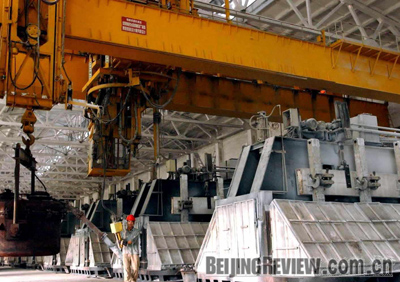|

SCALING DOWN: China’s rare earth companies, including the Aluminum
Corp. of China’s factory in Guangxi, have cut their production to
try to stabilize the prices of mineral resources
The prices of lead and zinc also have fallen dramatically. China is a major global supplier of lead and zinc, but its exports of them have dropped markedly this year. With continuously increasing production costs, the companies’ operations have reached a critical point.
Statistics from the CNMIA indicated that in 2007, the output of China’s 10 nonferrous metals totaled 23.61 million tons, ranking first in the world for the sixth consecutive year. Zinc prices on the international market dropped from $4,166 per ton in May 2007 to less than $2,000 per ton in July 2008. Lead prices also fell from $3,895 per ton in October 2007 to $2,116 per ton in July 2008.
Among resource products, copper has maintained a strong price. In April and July, copper prices hit $8,889 per ton and $8,940 per ton, respectively. But since the end of July, they started falling markedly. By August 12, copper prices had dropped to $7,120 per ton, a decline of 20.35 percent compared with their high point in July.
Li Kun, Vice General Manager of Sichuan Hongda Co. Ltd., whose major products are lead and zinc, has said on several public occasions that cutting production may be the only thing for companies to do now and that it was wise to do so to stabilize prices.
Resigned choice
But cutting production to stabilize prices is a resigned choice for some industry executives.
Fan Jianping, Chief Economist of the State Information Center, told Beijing Review that under the present background of the economic slowdown and increasing inflation, the problem of excess capacity in the manufacturing industries has become apparent. As raw materials for manufacturing industries, resource products are suffering from declining market demand. Under such circumstances, even cutting production would not guarantee that prices would rise as they have done in the previous two years, he said.
Fan said prices fluctuate naturally, and price drops of resource products are decided by inherent supply and demand factors. In the past two years, the prices of major resources and basic raw materials have kept rising, so that a downturn adjustment has become inevitable.
The slowdown of world economic growth has caused the market demand for some resource products to drop off, Fan said. The nonferrous metal industry in particular has stepped onto a downturn track, he added.
| 